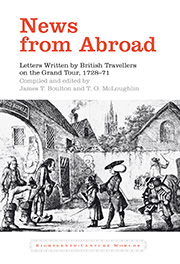Book contents
- Frontmatter
- Contents
- Preface
- Illustrations
- Acknowledgements
- ‘Old Style’ and ‘New Style’ Dating
- Map
- Introduction: The Grand Tour
- The Tourists and Their Letters
- George Lyttelton (1709–73): Letters (1728–30)
- Joseph Spence (1699–1768): Letters (1730–3)
- James Boswell (1740–95): Letters (1764–6)
- James Barry (1741–1806): Letters (1765–71)
- Caroline Lennox (1723–74): Letters (1766–7)
- Appendix A The Hazards of Collecting Art on the Grand Tour
- Appendix B Advice to Travellers on the Grand Tour
- Bibliography
- Index
George Lyttelton (1709–73): Letters (1728–30)
- Frontmatter
- Contents
- Preface
- Illustrations
- Acknowledgements
- ‘Old Style’ and ‘New Style’ Dating
- Map
- Introduction: The Grand Tour
- The Tourists and Their Letters
- George Lyttelton (1709–73): Letters (1728–30)
- Joseph Spence (1699–1768): Letters (1730–3)
- James Boswell (1740–95): Letters (1764–6)
- James Barry (1741–1806): Letters (1765–71)
- Caroline Lennox (1723–74): Letters (1766–7)
- Appendix A The Hazards of Collecting Art on the Grand Tour
- Appendix B Advice to Travellers on the Grand Tour
- Bibliography
- Index
Summary
WITH A SINGLE EXCEPTION, all the letters printed here, written while George Lyttelton was on the Grand Tour, were addressed to his father, Sir Thomas Lyttelton (1685–1751), landowner and politician, of Hagley Hall in Worcestershire (the exception being a letter from father to son). His mother, Christian, nee Temple (1688–1748), was the sister of Richard Temple (1675–1749), first Viscount Cobham, owner of the renowned estate at Stowe, which she often visited and which Lyttelton later attempted to rival by his development of the grounds at Hagley. George was the eldest of his parents' 12 children, four of whom died young; the letters contain occasional affectionate references to his siblings, especially his sisters Christian (‘Chrissy’) wife of Thomas Pitt (1705–61), and Molly.
The young man who embarked on the Grand Tour in February 1728 was highly educated—at Eton and Christ Church, Oxford—with strong scholarly inclinations, as well as political interests and ambitions: exactly the kind of person likely to benefit from the social and cultural experiences awaiting him in Europe. His literary bent was obvious, even before his departure. He had already published ‘Blenheim’ — a poem in Miltonic blank verse — in praise of the Churchill family: as is clear from the opening letter below, Sarah, widow of the illustrious Duke of Marlborough, rejoiced in the poetic compliments paid to her—‘in her mind/ [Marlborough] Found greatness equal to his own’.
- Type
- Chapter
- Information
- News from AbroadLetters Written by British Travellers on the Grand Tour, 1728–71, pp. 23 - 80Publisher: Liverpool University PressPrint publication year: 2012

